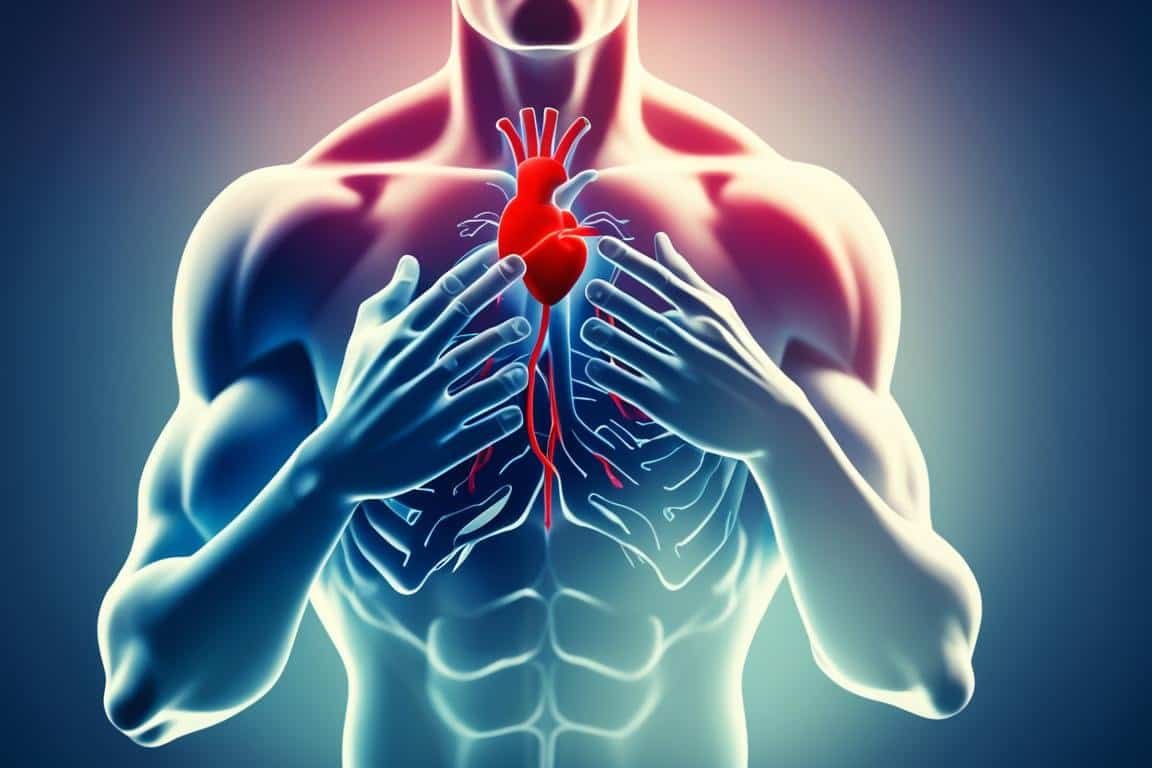When it comes to your health, it’s important to be aware of the warning signs that could indicate a heart problem. While coughing can be a symptom of a heart attack, it’s not always easy to identify. In this article, we’ll explore the connection between coughing and heart attacks, as well as other key symptoms to watch out for.
Key Takeaways:
- Coughing can be a symptom of a heart attack, but it’s not always the case.
- Common signs of a heart attack include chest pain, tightness, or pressure.
- Other symptoms to watch out for include shortness of breath, unexplained fatigue, and dizziness.
- Women may experience unique symptoms during a heart attack, such as nausea and pain in the back, neck, jaw, or throat.
- Men may experience classic symptoms of a heart attack, such as chest pain, as well as atypical symptoms like shortness of breath and pain in the arms or shoulders.
Warning Signs in Women
Women may experience unique symptoms during a heart attack. It’s important for women to be aware of the signs and symptoms that could indicate a heart problem. While chest pain is a common symptom for both men and women, women may also experience additional warning signs.
Some of the signs of a heart attack in women include:
- Discomfort or pain in the back, neck, jaw, or throat: Women may feel pain or discomfort in areas other than the chest during a heart attack. This could be a dull ache or a sharp pain.
- Nausea or vomiting: Women may experience feelings of nausea or may actually vomit during a heart attack. These symptoms, particularly when combined with other signs, should not be ignored.
Other symptoms that women may experience include:
- Shortness of breath: Women may feel out of breath or have difficulty breathing.
- Fatigue: Women may feel unusually tired or fatigued, even after light physical activity.
- Flu-like symptoms: Women may experience flu-like symptoms, such as sweating, lightheadedness, or weakness.
If you are a woman and experience any of these signs or symptoms, it’s important to seek medical attention immediately. Remember, early detection and treatment can save lives.

Warning Signs in Men
When it comes to heart attacks, men may experience both classic and atypical symptoms. While chest pain or discomfort is a common warning sign, men can also have other symptoms that should not be overlooked. It’s important to recognize these signs and seek medical help if you suspect a heart problem.
Common symptoms of a heart attack in men include:
- Chest pain or discomfort
- Shortness of breath
- Pain or discomfort in the arms, shoulders, or back
- Lightheadedness
These classic symptoms can be easily recognized, but it’s equally important to be aware of the atypical signs that men may experience. This can include shortness of breath or difficulty breathing, discomfort in the jaw or throat, and unexplained fatigue.

Recognizing the warning signs of a heart attack and taking prompt action can be life-saving. If you or someone you know experiences any of these symptoms, especially if you have known risk factors for heart disease, don’t hesitate to call for emergency medical assistance.
| Symptom | Heart Attack | Normal |
|---|---|---|
| Chest Pain or Discomfort | ✓ | |
| Shortness of Breath | ✓ | |
| Pain or Discomfort in Arms, Shoulders, or Back | ✓ | |
| Lightheadedness | ✓ | |
| Discomfort in Jaw or Throat | ✓ | |
| Unexplained Fatigue | ✓ |
Coughing and Heart Failure
In some cases, a persistent cough can be a sign of heart failure. Heart failure occurs when the heart is unable to pump blood effectively, causing fluid to build up in the lungs. This can lead to a cough that produces white or pink mucus.
Other symptoms of heart failure include:
- Chest pain
- Fatigue
- Swelling in the legs and ankles
- Difficulty breathing
If you have a persistent cough, it is important to consult with your doctor to determine the underlying cause. They will be able to evaluate your symptoms, perform any necessary tests, and provide appropriate treatment options.
Remember, early detection and management of heart failure symptoms can help improve your quality of life and overall prognosis. Don’t hesitate to seek medical attention if you experience any symptoms of heart failure or if you have concerns about your heart health.
Other Heart-related Symptoms
In addition to coughing, there are other symptoms that can indicate a heart problem. It’s essential to be aware of these signs and take them seriously, especially if you have known risk factors for heart disease. Here are some symptoms you should pay attention to:
- Pain or discomfort in the throat or jaw
- Unexplained weakness or fatigue
- Excessive sweating
- Lightheadedness or fainting
- Palpitations or irregular heartbeat
If you experience any of these symptoms, it is important to seek medical attention. Remember, early detection and treatment can save lives and prevent further complications.
| Symptom | Description |
|---|---|
| Pain or discomfort in the throat or jaw | This can be a sign of angina, a condition caused by reduced blood flow to the heart. It is often described as a squeezing, burning, or pressure-like sensation in the throat or jaw. |
| Unexplained weakness or fatigue | Feeling excessively tired or weak, even after getting enough rest, can be a symptom of heart disease. This is due to the heart’s reduced ability to pump blood effectively. |
| Excessive sweating | Experiencing profuse sweating, especially without any apparent cause, can be a sign of a heart problem. Sweating might be more pronounced during physical activity or even at rest. |
| Lightheadedness or fainting | Feeling dizzy, lightheaded, or actually fainting can indicate a drop in blood pressure, which may be related to an underlying heart issue. |
| Palpitations or irregular heartbeat | Noticing a rapid, pounding, or irregular heartbeat can be a symptom of arrhythmia, a condition that affects the heart’s rhythm. This sensation can be uncomfortable and alarming. |
It is important to take any potential heart-related symptoms seriously and consult with a healthcare professional for a thorough evaluation. Remember, your heart health is crucial for your overall well-being.
Conclusion
Coughing can be a sign of a heart attack, but it is not always the case. It is important to be aware of the warning signs and symptoms of a heart attack, such as chest pain, shortness of breath, and fatigue. If you experience any of these symptoms, especially if you have known risk factors for heart disease, it is important to seek medical attention. Remember, early detection and treatment can save lives.
Being proactive about your heart health is crucial. By recognizing the signs and symptoms of a heart attack, you can take immediate action and potentially prevent a life-threatening event. It’s important to pay attention to any chest pain, tightness, or pressure that lasts more than a few minutes. Additionally, be mindful of other warning signs like shortness of breath, unexplained fatigue, and pain radiating down the left side of your body.
If you experience any of these symptoms, do not hesitate to seek medical help. Time is of the essence when it comes to a heart attack. Early intervention can greatly increase your chances of a positive outcome. Make sure to communicate your symptoms to your healthcare provider, especially if you have known risk factors for heart disease like high blood pressure, diabetes, or a family history of heart problems.
In conclusion, while coughing can sometimes be a sign of a heart attack, it is crucial to consider other symptoms and risk factors. Stay vigilant, listen to your body, and prioritize your heart health. Remember, taking proactive steps and seeking medical attention when necessary can potentially save your life.

